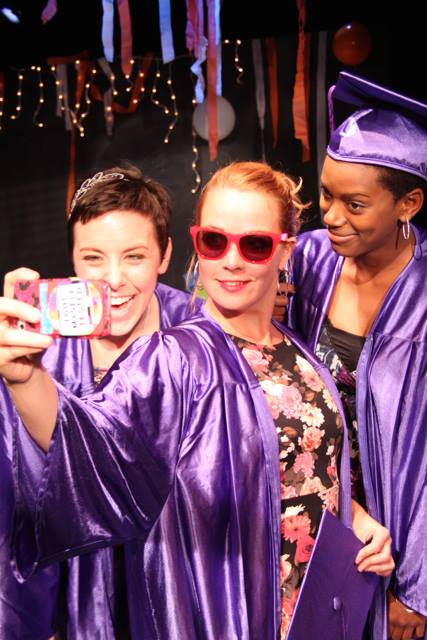
Adulthood blows. Enjoy your youth now. Photo Credit: Ron Spalletta
Presented by Boston Public Works Theatre Company
By Emily Kaye Lazzaro
Directed by A. Nora Long
June 5 – 20, 2015
Boston Center for the Arts
Plaza Black Box
Boston, MA
BPW on Facebook
Review by Kitty Drexel
(Boston, MA) Hollywood characterizes women like they’re mysterious flowers incapable of raunch or, conversely, like unsexy raunch-machines that repel penises. Theatre is kinder to us by generally allowing us our humanity, albeit a fragile one that must be guarded… unless characterizing us as a Strong Female Character who is impervious to nurturing. The unjust stereotypes abound. Why can’t we be complicated people who attempted to appropriately abide the status quo while farting into a void? This is who we are. You know, just like dudes.
Emily Kaye Lazzaro writes in Three‘s programme’s welcome note that she received a missive from a well-intentioned male actor about casting. The dude pondered the all female cast, wondering what the production would be like if the casting included the penis-enabled. Lazzaro continues in her note that she believes the actor’s impulse was to “search for the men.” While this is true, I’d like to think that this actor was so taken by Lazzaro’s natural writing for imperfect but lovable characters that this he wanted in on the action. Lazzaro’s character interactions are deeply relatable, poignant and, true to life. It’s not everyday that one can perform and clean house at the same time.
The script of Three depicts our heroines in their natural states: unsexy, frequently foul-mouthed, emotionally messy. Their private behavior would typically be considered typical public frat boy behavior: bathroom humor, day-drinking, making the world your bathroom, etc. Antics aside, it is a play about three women (Tasia Jones, Kelly Chick, Sarah Elizabeth Bedard) messily breaching adulthood in NY. We watch them navigate the speed bumps of life: graduation day, a bachelorette party, and a funeral. They grow up, away and out as they accept their regrets, realize new dreams, and rehash old times. It’s a heady combination of Bridesmaids meets The Women (1939).
Jones, Chick and Bedard are fantastic. Their performances were energetic and truthful. They were engaging and damn hilarious. Bedard’s physical comedy had me laughing so hard I nearly peed myself.
The set and props by Shelley Barish cleverly effective. Both elements are functional while expressing the symbolic and/or literal messes the characters make of their lives. The collegiate mounds of excess easily translated to the bar scene to be used as stools.The drooping graduation decorations in scene one were reminiscent of carcasses of regret at the funeral. We were effectively propelled into the correct headspace for the performance.
This play is a lot of talk and less action. As in real life, the characters sit, talk, sometimes move about, but then sit and talk some more. With some exceptions, there is enough staging through conversations that the audience won’t get bored. Scene two takes place in a bar and is mostly staged as static sitting. After a few consecutive minutes of this, the energy of the performance dropped. Just after the audience got fidgety, we were given some physical comedy and the energy picked up again. Small moments like this made Three occasionally rough for impatient audience members.
It is refreshing, and dare I say, provocative, to see women-children portrayed as just as messed up/complicated as men-children negotiating similar scenarios. It’s as if Lazzaro took everyday stereotypes such as the sensitive brainiac, the Strong Female™ , and the Whore™ and gave them fleshy backstories. Now, that isn’t to say that men don’t have a presence in this production. Men occupy the roles that women normally would: offstage, tertiary and minor because the stories we’re hearing wouldn’t be enhanced by their presence. Men play an important part in the lives of these women, just not a central one for the sake of the story. How’s that for novelty?
